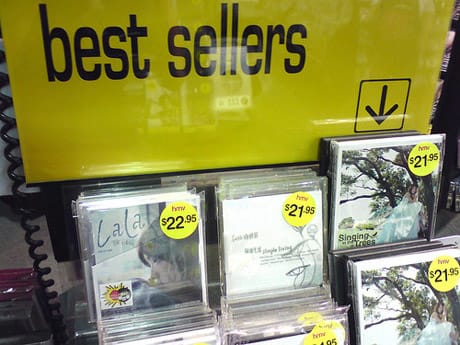Music distributors are the link between labels and retailers. Their job is to get records on the racks and make 'em sell. And not just the physical racks - music distributors are also in the digital distribution business; they can help get your record on iTunes and everywhere else. You need a distribution deal to access certain FACTOR and other grants. So, as a baby label or a self-releasing artist crafting your world domination strategy, you need to make getting a good distributor on board a top priority.
But even as brick and mortar retail appears to be nearing the final throes, the few remaining independent Canadian distributors are being absolutely besieged by everyone and their dog looking for a distro deal. Since the supply of music far outweighs the retail demand for product, distributors have to be selective in what they take on. It's not good enough to go to a distributor with a great album. It has to be a great album with demonstrable sales potential.
That said, here are a few pointers that will help you attract distribution.
1. Distributors know it costs money to get a record into stores - manufacturing, marketing, shipping, warehousing and overhead costs can really add up. If you can find a way to take on any of these costs yourself - by paying for your own manufacturing, or by getting a grant to pay for some marketing costs - be ready to put that on the table.
2. Know your fan base and your market and prepare an informal marketing plan that sets out sellable points about you and your album's past, present and future. Have realistic retail expectations: you won't get into WalMart with your latest noisecore masterpiece... but do bring all your local and scene-related relationships into the discussion. Try to think like a retailer: what's going to help me sell records? For example, if you can pull together an in-store or two, or put together a contest or offer up free stuff, fantastic.
3. Prove that your record has a retail base you can get to. Keep track of everything you sell at shows, or that you've already sold in your local record stores. Make a note of your web traffic including how many visits you get to your website, and how many plays your Myspace playlist is getting, and give this info to the distributor. Glowing reviews are nice too, but they don't sell records.
4. Be prepared to tour the album around the release date. If you can't book a tour for six months, then expect distributors to want to delay the release until then. Retailers won't order the album unless it's going to sell, and it's not going to sell unless you are out there promoting it.
5. Be businesslike in your dealings. The last people a distributor wants to deal with are flaky artists or labels who can't get their shit together. Learn about distribution and retail practises. Research and understand standard terms before you get on the phone with a potential distribution partner. Return phone calls and emails in a timely manner. The impression you make as a decent administrator of your own business will very much help your cause when negotiating with other businesses.
But even as brick and mortar retail appears to be nearing the final throes, the few remaining independent Canadian distributors are being absolutely besieged by everyone and their dog looking for a distro deal. Since the supply of music far outweighs the retail demand for product, distributors have to be selective in what they take on. It's not good enough to go to a distributor with a great album. It has to be a great album with demonstrable sales potential.
That said, here are a few pointers that will help you attract distribution.
1. Distributors know it costs money to get a record into stores - manufacturing, marketing, shipping, warehousing and overhead costs can really add up. If you can find a way to take on any of these costs yourself - by paying for your own manufacturing, or by getting a grant to pay for some marketing costs - be ready to put that on the table.
2. Know your fan base and your market and prepare an informal marketing plan that sets out sellable points about you and your album's past, present and future. Have realistic retail expectations: you won't get into WalMart with your latest noisecore masterpiece... but do bring all your local and scene-related relationships into the discussion. Try to think like a retailer: what's going to help me sell records? For example, if you can pull together an in-store or two, or put together a contest or offer up free stuff, fantastic.
3. Prove that your record has a retail base you can get to. Keep track of everything you sell at shows, or that you've already sold in your local record stores. Make a note of your web traffic including how many visits you get to your website, and how many plays your Myspace playlist is getting, and give this info to the distributor. Glowing reviews are nice too, but they don't sell records.
4. Be prepared to tour the album around the release date. If you can't book a tour for six months, then expect distributors to want to delay the release until then. Retailers won't order the album unless it's going to sell, and it's not going to sell unless you are out there promoting it.
5. Be businesslike in your dealings. The last people a distributor wants to deal with are flaky artists or labels who can't get their shit together. Learn about distribution and retail practises. Research and understand standard terms before you get on the phone with a potential distribution partner. Return phone calls and emails in a timely manner. The impression you make as a decent administrator of your own business will very much help your cause when negotiating with other businesses.
